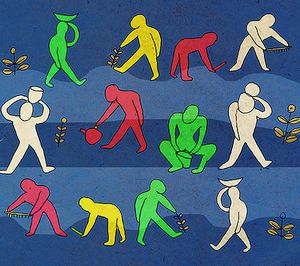The Covid-19 outbreak has brought the world to a standstill. Sweeping changes are necessary to contain the spread of the coronavirus. The interplay between the outbreak and the steps meant to vanquish it reveals a cruel paradox—the faster ordinary economic life shuts down, the faster the health crisis can be solved and faster people and businesses may gain the confidence to return to normalcy.
Contact tracing is of utmost importance to fight the pandemic on the ground. The government has been working tirelessly to contain the coronavirus and have succeeded in delaying its community transmission. As I am writing this, we have only 415 positive cases and eight deaths. I feel we have done a commendable act by learning from the mistakes of Italy, Spain and the United States.
In the United Kingdom, the idea of letting low-risk residents be infected by the virus as a way of generating immunity seems misplaced and disastrous, and it is a lesson to be learnt. The Janata Curfew implemented on March 22 was a success and I think even a lockdown of few hours went miles towards containing the coronavirus in our country. The country expressed gratitude to the health care workers and all those who are on the frontline in providing essential services in these dangerous times. In a move worthy of applause, the Gujarat government banned spitting in public to minimise the spread of the virus. This is the time to enforce no-spitting campaigns in public places.
The dreaded third phase of the coronavirus spread is here, and the only effective ways to stop it are self-isolation, avoiding physical contact and maintaining good hand-hygiene. Section 144 has been imposed in various parts of the country. A complete lockdown is important because the wildfire-like situation leaves us with little or no time to make a daily wage labourers understand the importance of social distancing. Once it reaches the lower economic strata, we will start to face a horrifying situation.
A major consequence of a lockdown is zero employment for daily wagers. State governments should take measures to distribute excess grains stocked in Food Corporation of India storage units through the public distribution system. They also need to create isolation wards and testing facilities in private hospitals to treat Covid-19 patients.
A quick revisit to the Indian format of living is also commendable which promotes vegetarianism, minimum contact with strangers, washing hands and feet before entering homes and the ayurvedic medicine system that stresses on strengthening immunity rather than the allopathic way of treating the symptoms.
The prime minister’s decision to hold an emergency videoconference with South Asian Association for Regional Cooperation leaders on combating Covid-19 was out-of-the-box thinking. The SAARC emergency fund has already been set up and will be operational by the time this piece goes into print. The fact that he made the videoconference available live indicates his desire to reach out to the public of SAARC countries and to support the strict actions being taken by respective governments. The cancellation of the SAARC summit in Islamabad in 2016—after the Uri attack—had left the bonhomie of the south Asian cooperation faded, but the tragedy of Covid-19 may provide an opportunity for India to demonstrate its compassionate face to secure a region at peace with itself.
Prime Minister Modi’s foreseeability can be assessed from the launching of Swachh Bharat Mission in 2014. It was allocated Rs12,644 crore and Rs12,300 crore in 2019-2020 and 2020-2021 Union budgets respectively. The spread of the virus is a reminder that being environment friendly is not a short-term choice, it should be a way of life much like our ancient Indian culture.


